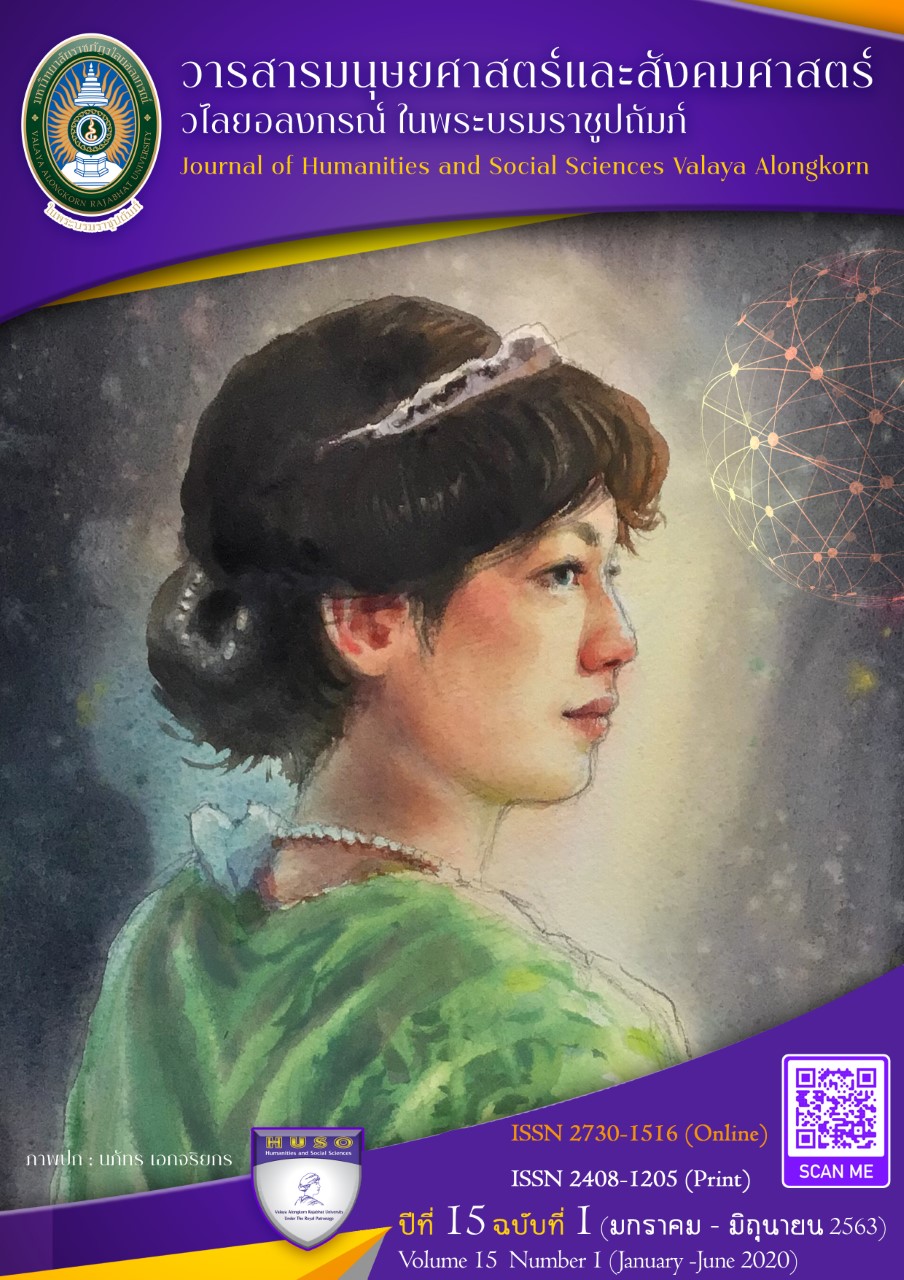THE EFFECTIVENESS OF A PROGRAM FOR PROMOTING SELF-EFFICACY ON LEARNING GOAL-SETTING BEHAVIOR OF GRADE 8 STUDENTS IN A DEMONSTRATION SCHOOL
Main Article Content
Abstract
The purpose of this research was to study the effectiveness of the self-efficacy promoting program on learning goal-setting behavior of grade 8 students who study in a demonstration school. The research methodology was Quasi-Experimental using one group pretest-posttest design. The participants were 11 students in grade 8 who had an average grade point lower than 2.00 when they were in grade 7. The research instruments were (1) the self-efficacy promoting program on learning goal-setting behavior which composed of 11 activities, 60 minutes in each activity, (2) learning goal-setting test, and (3) self-efficacy test. The statistics used for data analysis are the mean, standard deviation, comparing the average of t-test by using a Paired sample t-test. The results showed that participants had scored on learning goal-setting tests higher than before joining the program (t = -2.67, P ≤ .05), and score on self-efficacy test higher than before joining the program (t=-2.67, P ≤ .01). Therefore, this research shows that the self-efficacy promoting program on learning goal-setting behaviors increases students’ goal-setting behavior. This suggesting that developing students to set their learning goals is important. Besides self-efficacy, self-esteem and self-awareness is an interesting variable to encourages students to perceive their own learning goals.
Article Details
ลิขสิทธิ์บทความวิจัยที่ได้รับการตีพิมพ์เผยแพร่ในวารสารมนุษยศาสตร์และสังคมศาสตร์ วไลยอลงกรณ์ ในพระบรมราชูปถัมภ์ ถือเป็นกรรมสิทธิ์ของคณะมนุษยศาสตร์และสังคมศาสตร์ มหาวิทยาลัยราชภัฏวไลยอลงกรณ์ ในพระบรมราชูปถัมภ์ ห้ามนำข้อความทั้งหมดหรือบางส่วนไปพิมพ์ซ้ำ เว้นแต่จะได้รับอนุญาตจากมหาวิทยาลัยเป็นลายลักษณ์อักษร
ความรับผิดชอบ เนื้อหาต้นฉบับที่ปรากฏในวารสารมนุษยศาสตร์และสังคมศาสตร์ วไลยอลงกรณ์ ในพระบรมราชูปถัมภ์ เป็นความรับผิดชอบของผู้นิพนธ์บทความหรือผู้เขียนเอง ทั้งนี้ไม่รวมความผิดพลาดอันเกิดจากเทคนิคการพิมพ์
References
Bandura, A. (1991). Social cognitive theory of self-regulation. Organizational Behavior and Human Decision Processes, 50(2), 248-287.
Bruhn, A. L., Fernando, J., McDaniel, S., & Troughton, L. (2017). Putting Behavioral Goal-Setting Research Into Practice. Beyond Behavior, 26(2), 66-73.
Locke and Latham. (1990). A Theory of Goal Setting & Task Performance. New Jersey: Prentice Hall.
Rosen, J. G., EJ.; Dalton, BW.; Lennon, JM.; Bozick, RN.,. (2010). Noncognitive skills in the classroom: New perspectives on educational research. RTI International, PO Box 12194, Research Triangle Park, NC 27709-2194.
นฤมล สุ่นสวัสดิ์. (2558). การตั้งเป้าหมายของชีวิต และการทำงาน Setting Goals of Life and Work. วารสารสารสนเทศ, ปีที่ 14 ฉบับที่ 2 กรกฎาคม – ธันวาคม 2558.
นาฏศิลป์ คชประเสริฐ. (2557). ผลของโปรแกรมกิจกรรมแนะแนวเพื่อการตั้งเป้าหมายทางการศึกษาและอาชีพของนักเรียนชั้นมัธยมศึกษาปีที่ 4 โรงเรียนหันคาพิทยาคม จังหวัดชัยนาท. วิทยานิพนธ์ปริญญานิพนธ์ ศิลปศาสตรมหาบัณฑิต สาขาจิตวิทยาการศึกษาและการแนะแนว มหาวิทยาลัยเกษตรศาสตร์.
วิลาวัณย์ ดาราฉาย. (2554). ปัจจัยที่เกี่ยวข้องกับการรับรู้ความสามารถของตนด้านการเรียนของนักเรียนช่วงชั้นที่ 2-3. สารนิพนธ์ กศ.ม. สาขาจิตวิทยาพัฒนาการ มหาวิทยาลัย ศรีนครินทรวิโรฒ.
สมโภชน์ เอี่ยมสุภาษิต. (2562). ทฤษฎีและเทคนิคการปรับพฤติกรรม. พิมพ์ครั้งงที่ 9. กรุงเทพมหานคร : สำนักพิมพ์แห่งจุฬาลงกรณ์มหาวิทยาลัย.
สํานักงานเลขาธิการสภาการศึกษา กระทรวงศึกษาธิการ. (2560). แผนการศึกษาแห่งชาติ พ.ศ. 2560-2579. บริษัท พริกหวานกราฟฟิค จํากัด.
อริสา ภูริวัฒน์. (2553). ผลของโปรแกรมพัฒนาการตั้งเป้าหมายในการเรียนของนักเรียนช่วงชั้นที่ 3. สารนิพนธ์ กศ.ม.จิตวิทยาการแนะแนว มหาวิทยาลัยศรีนครินทรวิโรฒ.


